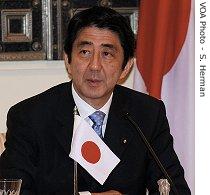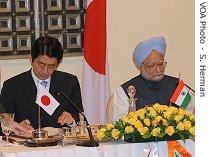2007年VOA标准英语-Japan Calls for Closer Strategic, Economic Ties(在线收听)
New Delhi
22 August 2007
Japan's prime minister, Shinzo Abe, has been accorded the rare honor of addressing India's parliament. VOA's Steve Herman in New Delhi reports the Japanese leader told Indian lawmakers Wednesday they need to consider a closer security alignment between the two Asian democracies.
 |
| Shinzo Abe |
"The strategic and global partnership of Japan and India is pivotal for such pursuits to be successful," he said. "By Japan and India coming together in this way this broader Asia will evolve into an immense network spanning the entirety of the Pacific Ocean, incorporating the United States of America and Australia."
Speaking to a joint session of India's parliament, Mr. Abe said the four nations working together could protect maritime shipping lanes, vital to the world economy.
The idea, a clear example of Japan's more muscular diplomacy, was greeted largely with silence.
Mr. Abe is also hoping to expand economic ties between the two Asian democracies, something pledged by both at a summit in Tokyo last December. But he noted more effort is needed to reach a free trade agreement.
"It is incumbent upon me to urge the Japanese negotiators to work to conclude promptly a comprehensive high quality economic partnership agreement between Japan and India which will set an example for the world," he said. "I likewise urge the Indian side to give their support to enable the early conclusion of this agreement."
 |
| Japanese PM Shinzo Abe (l) and Indian PM Manmohan Singh (r) sign a bilateral agreement in New Delhi, 22 Aug 2007 |
In his address, Mr. Abe did not mention the controversial civil nuclear agreement between India and the United States. He later told reporters Japan is watching very closely before deciding whether to back the deal, which could also pave the way for Japan to build nuclear power plants here.
Opposition to the deal from leftist Indian lawmakers is threatening the coalition government of Prime Minister Manmohan Singh.
Mr. Singh, at a news conference with his Japanese counterpart late Tuesday, expressed confidence the turmoil will not lead to the collapse of his government.
"It is certainly true that we have, I think, some turbulence in the political air in Delhi," he said. "But I am confident we shall be able to overcome it. As someone said, 'if winter comes, can spring be far behind?'"
Mr. Abe faces his own political troubles, suffering in the polls at home where he is seen as neglecting domestic social and economic issues at the expense of pushing his nationalistic vision for Japan.
The Japanese leader arrived in India after a visit to Indonesia. He will go to Malaysia on Thursday.
Mr. Abe's visit comes 50 years after that of then Prime Minister Nobusuke Kishi, the current leader's grandfather and the first Japanese leader to visit India.
Mr. Kishi's 1957 trip cleared the way for Tokyo to begin making yen loans to India at a time when Japan was still struggling economically in the wake of the devastation of World War II. By 1986, Japan was India's largest aid donor and has been ever since.